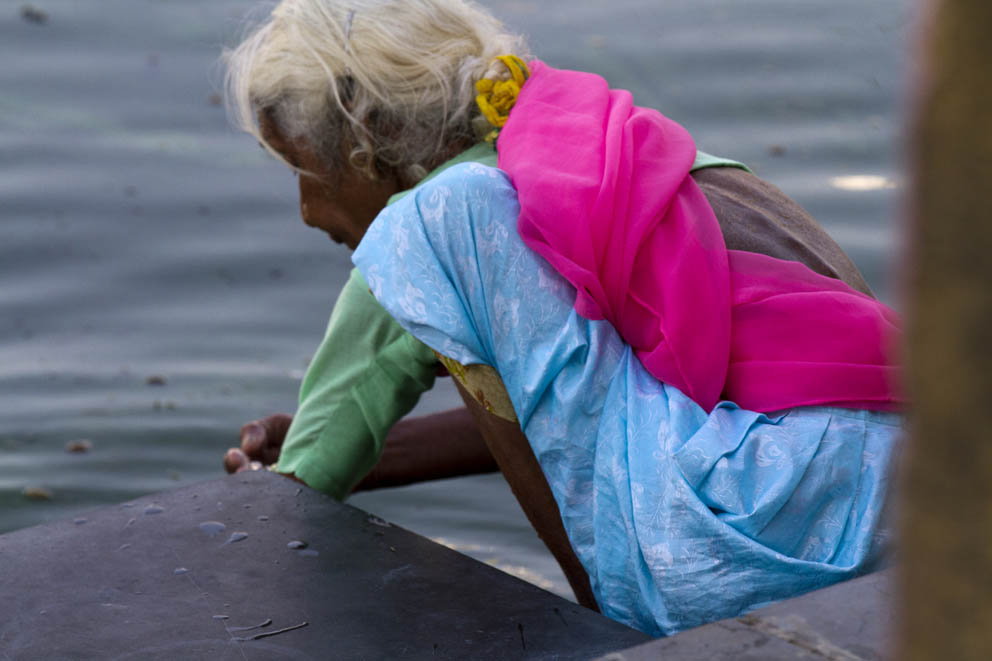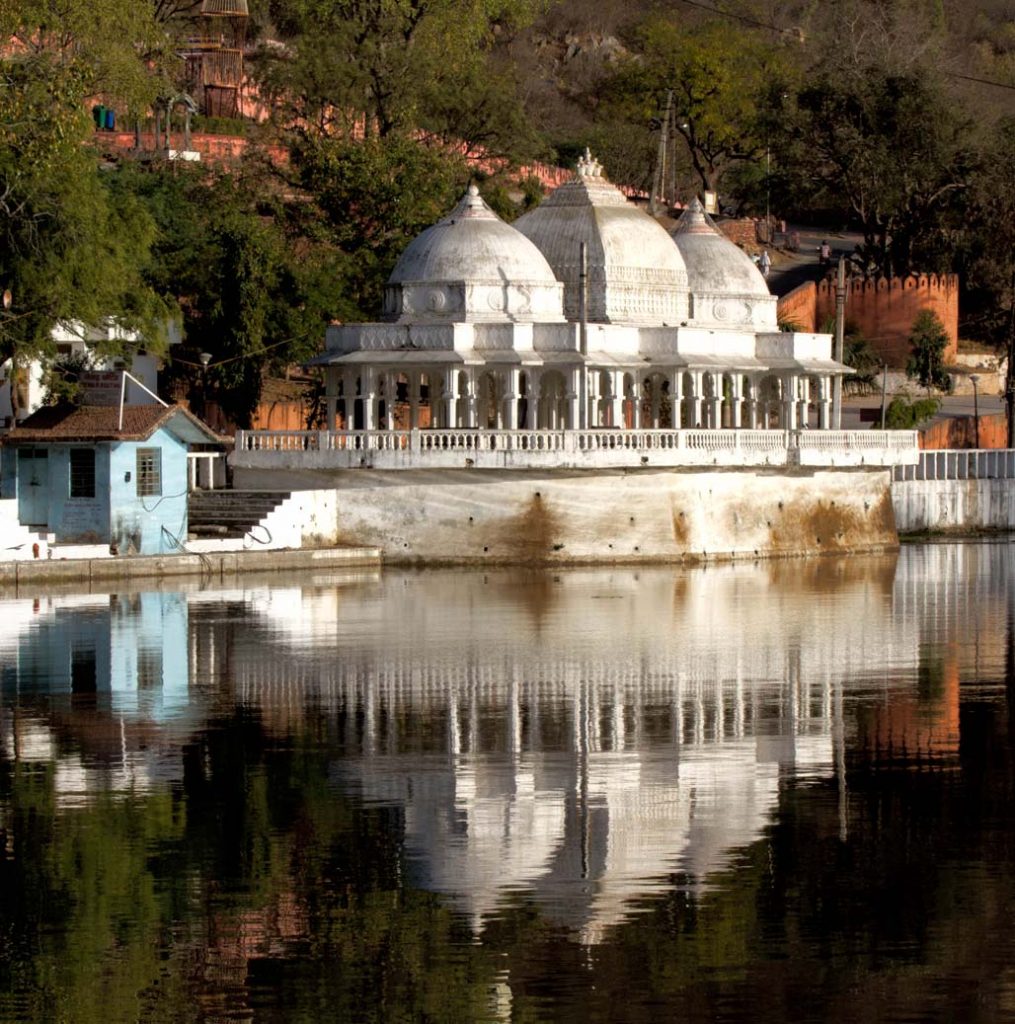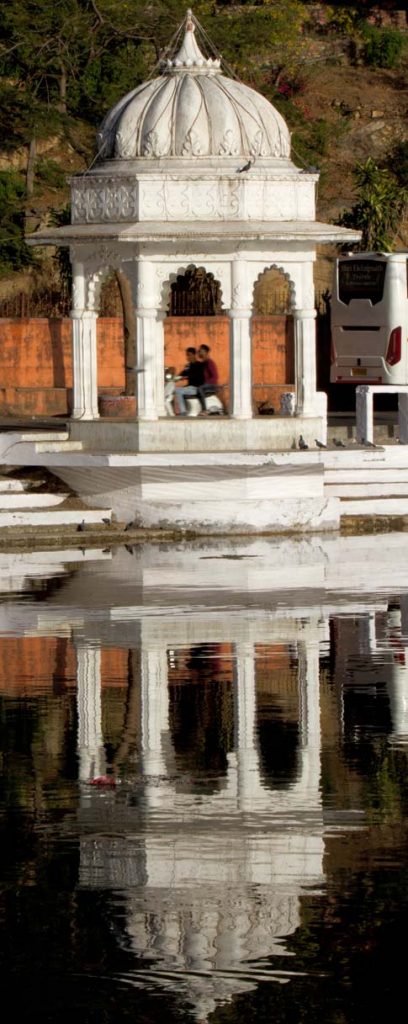Seven am. The rhythmic thumping of dhobi women on the ghat below has been with me since before dawn. As Rajasthani summer gathers pace, nights as hot as day have me sleeping nude without covers on the bed; fan on max, window wide open to the lake. I don’t sleep badly, just differently. I’m hearing the dhobi sound earlier, and doubt it’s because they’ve brought forward their daily routine.
The spreading peepal branches I spoke of in an earlier post foil my lens. With neither automatic nor manual focus can I get a satisfactory shot of the laundresses from my room. Through gaps in the foliage I catch the cool blue of rippled water, a flash here and there of colour and glimpse of tantalising brown skin as a woman part unfolds her sari with graceful decorum to bathe. One such gap reveals a cricket bat of a baton, repeatedly and with methodical efficiency raised high then brought down with gratifying thud on its dripping target, out of sight but not earshot; the flagellator half submerged on one of the many steps – on one of the many centuries old stone flights – down into the water.
Steps into water are one of Rajasthan’s many wonders. The above images, taken in September, are of a woman washing clothes here in Udaipur and of a stepping well near Jaipur. Though lake is lake, and well well, function and principle overlap. Pichola will dry up in a bad summer, and at best its level will fall sharply between now and August rains, assuming they don’t fail. The steps of well or ghat give access to such water as there is at its nadir, while alleviating the drudgery in the months of plenty. Half submerged on the step of optimal leverage for his or her height and reach, the dhobi can thwack baton down on wet textile with maximal force for minimal effort.
Even so, the work is hard enough for chatter to be low and intermittent. Now and then I hear a comment, clear as Krishna’s flute on the morning water, followed by a chorus of laughter. In the main though, the dominant sound at this hour – before traffic horn, Bollywood blare and holy incantation begin – is that dull smack of wood on the soaked and soapy.
For the first time, I realise it’s a sound I’ll miss.
* * *
Tomorrow evening I have a sleeper berth on an a/c Volvo night bus to Delhi, arriving around nine am. I’ll take metro to airport, where I have a room booked in a nearby hotel. I’ll spend the day writing, chilling or, if I slept well on the bus, taking the metro (minus luggage) back into the city for the day. The following morning I fly to Muscat, layover not two hours, then Heathrow.
Which is why I spent a few hours yesterday roaming Udaipur to capture sights I’m sure to miss. I need to do similar with sounds. (Shame I can’t do smells. Had olfactory information been as critical to our survival and ascendance as its aural and visual equivalents, humans would surely have found ways of recording, editing and encoding it: a shrine in every living room; packs of chemicals combined, recombined and released in amounts and combinations set by broadcast signal. Sharks, given our ability to reshape the natural world to requirement, would have found a way. Dogs too.) But here, in still images, are a few of the reasons I’ll miss Udaipur and India.
[ezcol_1third]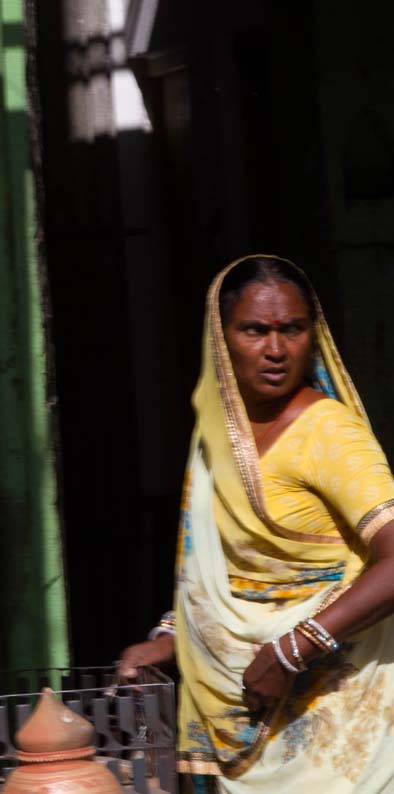 [/ezcol_1third] [ezcol_1third]
[/ezcol_1third] [ezcol_1third] [/ezcol_1third] [ezcol_1third_end]
[/ezcol_1third] [ezcol_1third_end]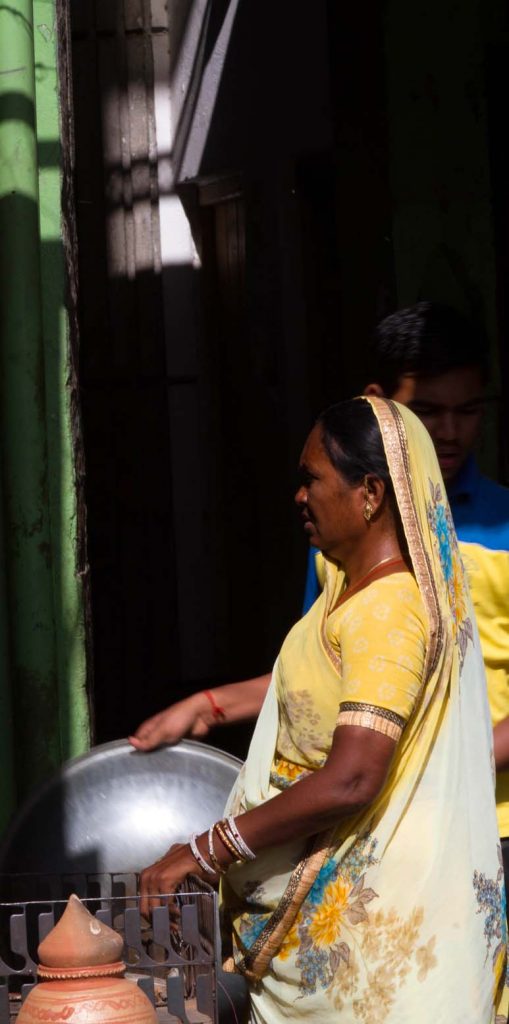
[/ezcol_1third_end]
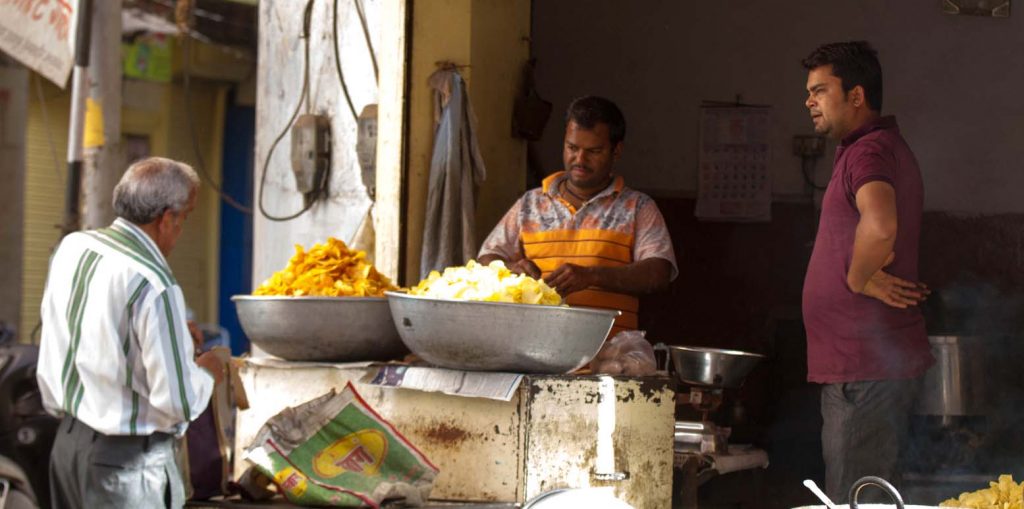
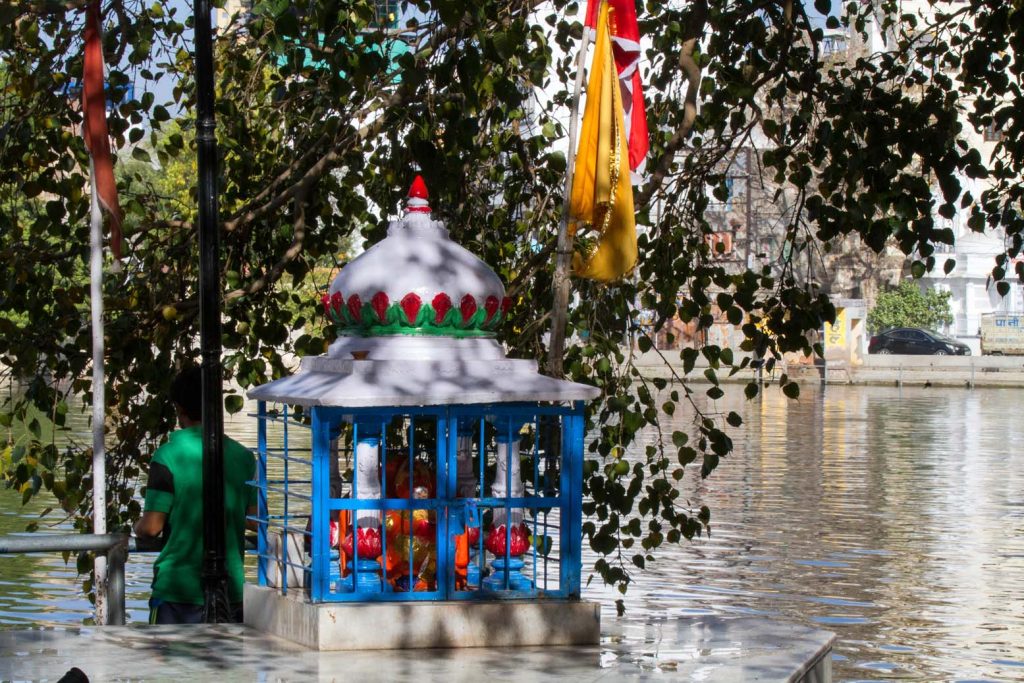
[ezcol_1half]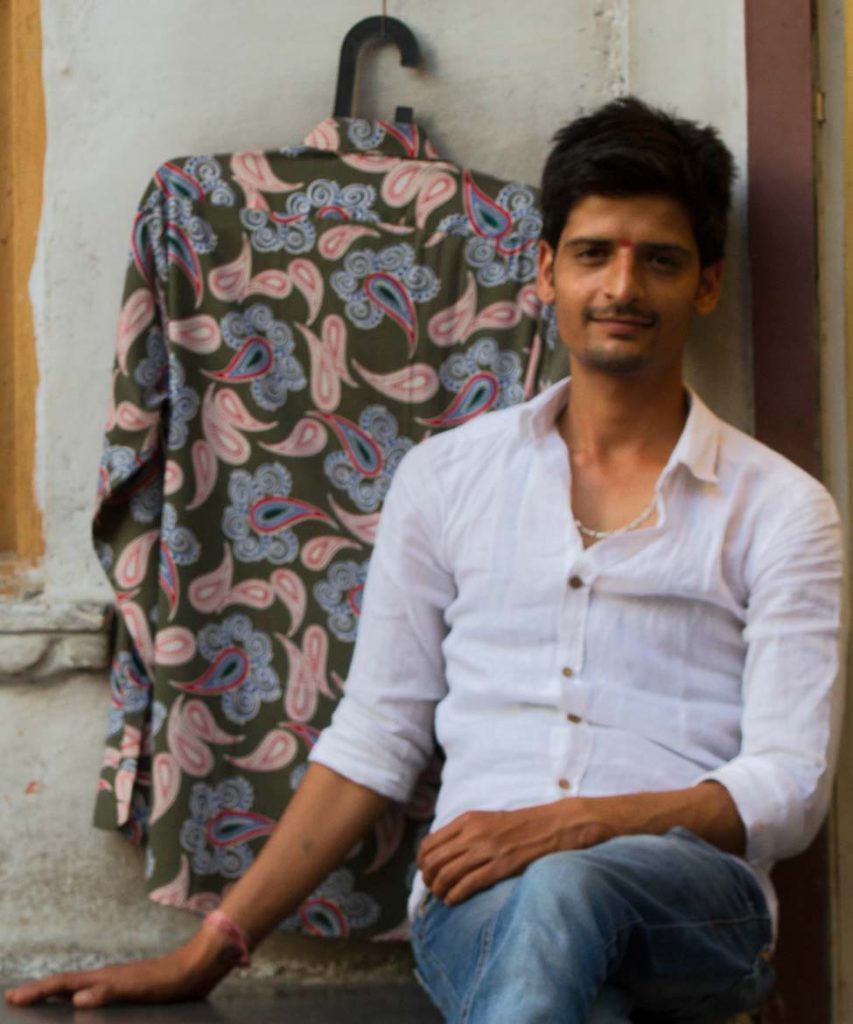
This beautiful young man sold, measured me for and delivered a fine kurta. Now he says I must come to live in Udaipur, where he’ll help me find a house to buy.
[/ezcol_1half] [ezcol_1half_end]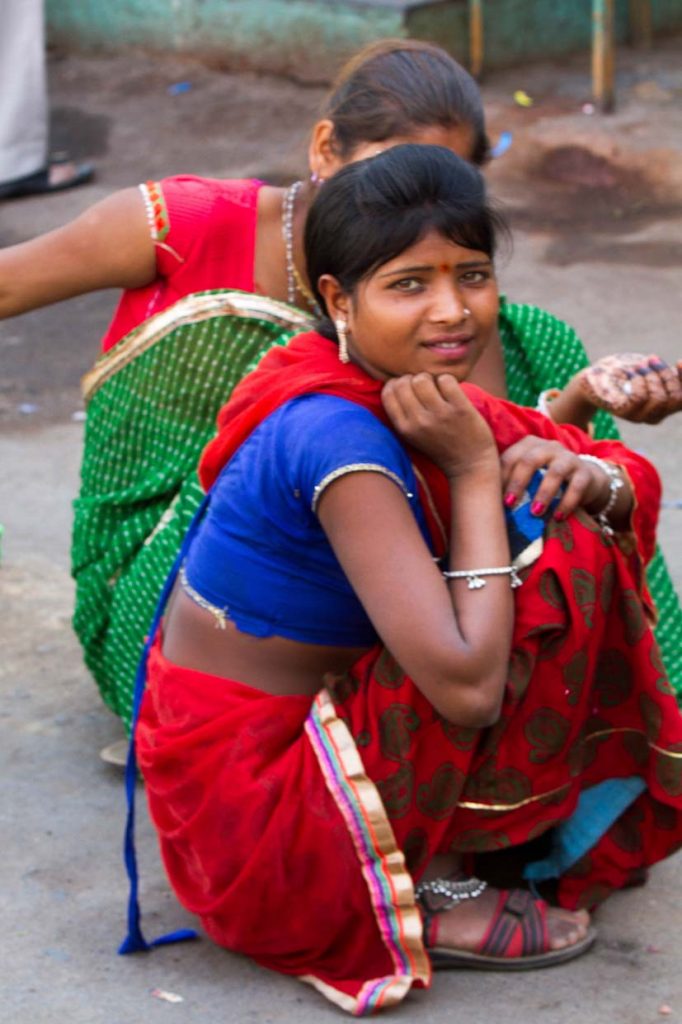 [/ezcol_1half_end]
[/ezcol_1half_end]
This beautiful scene (above!) will remind me, I’m afraid, of how at the moment I admired it a man rode up on a motorbike, sent a plastic bag of garbage sailing over the water to come down with a fat slap, then rode off. Litter’s an issue in Asia.
[/ezcol_1third] [ezcol_2third_end]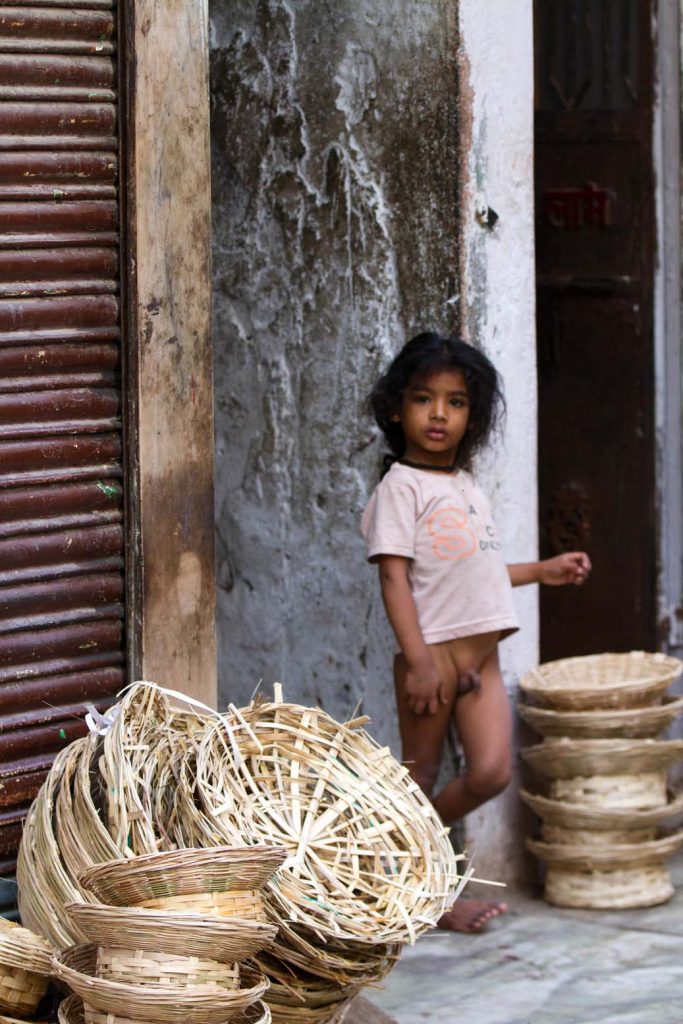 [/ezcol_2third_end]
[/ezcol_2third_end] 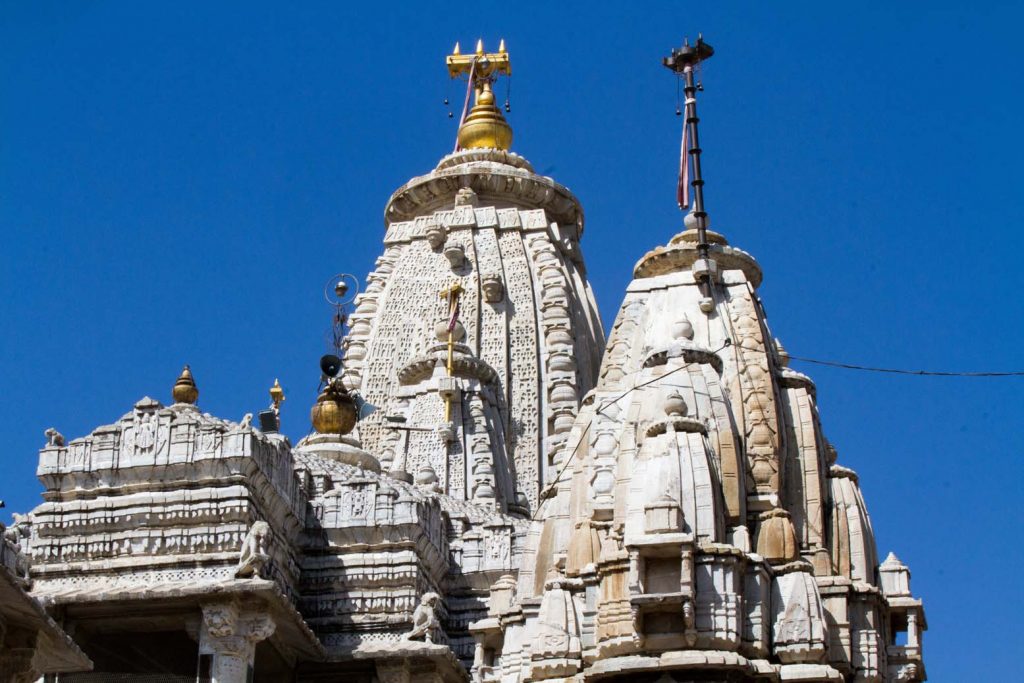
I won’t be coming home with rekindled desire for marijuana or, through it and more ominously, tobacco. Ditto the stronger psychotropics. I’ve enjoyed myself and more, and may indulge again in bhang and charas next time I’m in India. But as those seeking to relive nights of enchantment on Lesvos beaches discover, when shots of Ouzo at North European soirees on dank November evenings fail to reconjure the summer’s magic, some things just don’t travel.
A word about that last experience on bhang. After drinking the lassi, taken on top of the charas smoked with Guddu and Jai, I sat at a table in Guddu’s rooftop restaurant, manned by the calm and dependable Lalit. Behind me and ordering food sat the young Korean couple, next door to me in the one other guest room. Guddu flitted about, on the phone as ever, for all he’d had six parts to my four of the bhang in the two lassis he’d mixed.
I took in starry skies. I marvelled at the mauve and yellow of lights, mirrored on Pichola’s dark and glassy, from the ghats and posh hotels on the far bank. Guddu would tell me later I sat thus for over an hour, still and smiling, eight miles high. That accords with my recollection.
I owe Guddu and Lalit for averting what would have happened next. In one of those shifts that can without notice take over those in intermittent hallucination, where stray thought can in the blink of an eye become dream-state imperative, I knew I had to be in the cool quiet solitude of my room. Luckily for me I caught Guddu’s eye to say something to that effect, and that I’d be back in a while. That meant he was watching me as I approached – too slowly, he tells me – the top of the marble steps, just the one flight but steep, to my room. As I did whatever I did there, something of my incapacity must have registered. I knew – as, to my undying gratitude, did Guddu – I wasn’t going to make it. Though the effects of bhang could not be further from those of alcohol, I felt at that moment like a drunk, or seasick, or in the grip of sunstroke; basic motor functions no longer at my command.
For what felt ten minutes but Guddu says was one, I went to a hell I couldn’t describe even if I wanted to. I recall shouting and raving incoherently but Guddu insists I was silent, the only people in the restaurant with an inkling anything was amiss being he and Lalit. Which is why they materialised so swiftly to steady then half lift, half walk me to bed; my having shown just enough presence of mind and bodily control to hand over my key to Guddu.
The moment they lay me down I knew all was well: sufficiently so to feel, despite my ongoingly full-on trip, embarrassed; worried the scene I’d thrown would be bad for Guddu’s business. He laughed that off.
This is India. This is bhang. This stuff happens.
He and Lalit stayed to make sure I really was OK. I assured them I was more than OK. That I was flying, but now from a safe place I knew as such with every fibre of my being. His instructions before closing the door and opening my window wide – leaving curtains drawn at my request, that I might watch the lake – were exactly those I’d give to someone on a bad acid trip. Should I go back to that place I was to change the ambience … switch a light on or off … switch music on or off … bathe face in cold water … and above all …
… call me. I’ll be upstairs.
Again I assured him I was in a good place. And I stayed there; though tripping all the night at full strength, next day at half. The following evening I was able to quiz Guddu on how I’d seemed.
Anyone who knows bhang would have known you’d gone somewhere last night. In India these things are understood … all you have to do is ask for help. Lalit has seen me in that same state. Asking him to get me to bed – as we did you – was as simple as asking him to make chai.
There was another spin-off. Before, Guddu’s behaviour to me had been warm and professional, upgraded on our day on the motorbike to warm and friendly. Now, seeing me in the pink after my night on bhang, he greeted me with an embrace. As to a kinsman – or Fellow of the Ancient Order of Space Cadets.
* * *
I never did tell the story, though in my last post I returned to it, of how Udai Singh II survived – owing life and throne to Panna Dai, the nanny who sacrificed her own son that he might live – an assassination attempt at once regicidal (if slaying a prince only third in line qualifies as such), nepoticidal (not fratricidal, as I erroneously claimed) and infanticidal. I doubt I will now, though it’s a cracking yarn.
* * *
Besides sultry nights, oncoming summer brings lower limpidity to Pichola. On the footbridge at eight-thirty, sun already high and blazing, I gaze down into water still clear – though less so and with newly green tint – but all aboil as fry scatter every which way before pipefish I described earlier as eel-like but now, predating rather than preyed on, remind me of pike in the way hefty shoulder gives way to elongated snout. Focused on the minnows leaping clean out the water in their desperation, diner risks being dinner for diving cormorant. I muse on this wheel of death – and on Jai’s question: what is life?
A confusing business, I say, for those high enough on Mount Maslow to have time for such a question instead of being preoccupied 24/7 with eating and avoiding being eaten. For the first group life can seem randomly cruel, all pointless suffering. We are obliged by our unsuitedness for solo survival to enter into – or more accurately be born into – social relations to produce and reproduce the material conditions of existence. Those relations in turn oblige the managing of tensions between our individuated and social natures, not least by tempering power with morality but that’s a damage limitation exercise. The educated westerner is often naive, where those on zero hour contracts or in the Global South are not, in having a poor grasp of how the world works; taking at face value the forms of democracy.
Why do we buy the increasingly nonsensical reality-inversions of corporate media, including the sixth form apologetics of the liberal press? Because, I believe, the idea of our leaders as agents, conscious or otherwise, of the most predatory forces on the planet is too shocking to accept. We are the good guys, right?
Well, right if we refuse to step back from what we think we know, and adopt the perspective of the proverbial Martian. Going on facts – as opposed to a matrix of assumptions internally more or less consistent but grounded in ideological axioms topped up by the spin of media whose revenue dependencies demand support, when push comes to shove, of the status quo – we’d have to conclude that The West is doing as it has for centuries done: condemning the Global South to misery, exploitation and terror that our true rulers may enjoy untold wealth and power, their subjects induced by small bribes and huge diversions to look the other way.
By any objective measure – invasions since WW2 .. actual use of nuclear weapons .. refusal to forgo first-strike use of same .. eastward expansion of NATO .. $10 trillion for-profit arms sector ($596 billion a year) .. military bases across the globe .. covert regime change .. overt regime change and terror – the USA is far and away the world’s most dangerous nation. (From the post, Smoke and Mirrors: the war on ‘fake news’.)
Just yesterday I read of western ‘alarm’ at nasty Russian warlords refusing to give two Libyan ports Back To The People. (That I gave the piece time of day shows my thoughts turning once more westward.) I take my hat off to the breathtaking chutzpah of such ringing denunciation, so magnificent a show of crocodile tears. For all his faults – not all fabricated in Washington and London for relay by Graun, Beeb and NYT – Gaddafi had used oil revenues to enrich his people, delivering (as had both Assads) the best welfare infrastructure and highest literacy rates outside the OECD. For reasons I explore elsewhere this displeased Washington and London, IMF and Wall Street. The rest is scorched earth history, albeit history still in the making.
With unblushing effrontery (credit here to the departed but unforgettable Sam Powers at the UN, a fine exemplar of what her compatriots call a piece of work ) those imperial interests now profess outrage at the fruits of mayhem – criminally insane but not unfathomable mayhem – Withheld From The Libyan People as ‘represented’ by upstarts. That would be salafist upstarts – as clear a demonstration of the west’s true priorities as the Guardian at its most myopic could choose to ignore – shoehorned into what passes for office in that Hillary-made wasteland to keep western capital in control of the oil. Also to keep, we should add, the world aware of what happens to those who defy the will of Wall Street without first taking out the insurance policy of a nuclear deterrent.
None of which negates my claim that life is love. Now in my sixties I strive, having meandered all over the show in youth and middle age, to square, if only in words, the ugliness of this world with life’s all embracing and irreducible beauty.
By such meditations my awareness turns slowly westward, anticipating my return to what is sometimes called real life.

